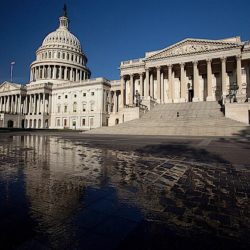A version of this article originally appeared in the World Business Academy’s monthly publication Currents in Commerce. Join our mailing list to receive Currents in your inbox.
How did the U.S. political system get so dysfunctional that a small group of right-wing extremists could shut down the government and bring the country to the brink of default on obligations that Congress had already authorized through the normal budget process?
Here’s part of the answer: House districts gerrymandered to be safe for the right wing, an ineffective media, and a political system awash in money. But the crisis couldn’t have happened without the nonsensical rule known as “the federal debt ceiling” which requires Congress to vote on whether the country will pay its bills if Congress has failed to match spending with revenue.
As recently as the late 1970s, “the Gephardt rule” automatically aligned the debt ceiling with the Congressional budget. As Warren Buffett has said, “The debt ceiling makes no sense.” Fed Reserve Chairman Bernanke compares “not raising the debt ceiling to a family of debtors who skip out on their bills, saying, ‘we’re spending too much, let’s stop paying our credit card bill.’”
This was “a federal budget crisis months in the planning” by well-financed and interconnected groups. When the President refused to give into the Tea Party’s demands to defund or delay Obamacare, they tried to recast the shutdown as a response to runaway government spending.
In fact, the depth and pace of federal spending cuts have slowed the U.S. economic recovery. The U.S. budget deficit is dropping fast, as Dean Baker explains in “Republicans are delusional about US spending and deficits.” “Since 2010, deficit reduction has been more rapid than in any 3-year period since the demobilization following World War II,” Businessweek reports. By this past June, the deficit-to-GDP ratio had been reduced to half its 2011 level, according to Bloomberg. Deutsche Bank calculates that the deficit is now 4% of the aggregate economy, down from 10% in 2009. President Obama is “the smallest government spender since Eisenhower,” Forbes reports.
The media obscured the big story that Republican House leaders refused to call a vote on the shutdown and debt default, knowing that a bipartisan House majority opposed both tactics. Republican leaders even changed House rules so other Members couldn’t call a vote after Speaker Boehner refused. The media also failed by framing the story as bipartisan gridlock between two equally culpable, stubborn sides, as James Fallows James Poniewozik, and Carl Bernstein said in blasting the false equivalence that pervaded the media coverage. James Fallows’ false-equivalence guide in The Atlantic offered this: “Any story that presents the disagreements as…a “failure of leadership,” a sign of “partisan gridlock” … represents a failure of journalism and an inability to see or describe what is going on.” The present intra-party Republican battle is about whether compromise itself is legitimate—a distain for democracy largely absent from the last 150 years of U.S. history and utterly inconsistent with representative democracy.
The press in Britain, France, Greece, and China did not mince words discussing the breakdown of the U.S. political system. China, which holds about $1.28 trillion of U.S. debt, called for a “de-Americanized world,” which would include a new international reserve currency to replace the U.S. dollar. The Tea Party and their allies in Congress were oblivious to the role of U.S. Treasuries in the global financial system, the benefits of the dollar’s status as the world’s reserve currency, and the risk of another global recession if the U.S. defaulted on its debts.
The Senate and House vote (81-18 and 285-144, respectively) to end the 16-day shutdown after a $28 billion blow to the U.S. economy merely postponed the day of reckoning for a few months.
Ted Cruz and his Tea Party allies have said they are looking forward to shutting down the government again. They are still trying to make Obamacare the President’s Waterloo and to cut Medicare and Social Security.
Americans must mobilize to reform their broken political system and growing economic inequality.
Any discussions about fixing the nation’s long-term fiscal problems must focus on raising revenue through long overdue tax and financial system reforms (e.g., a new financial transactions tax, an end to the “carried interest” tax loophole for hedge fund managers, and an end to multinational corporations’ ability to shift profits overseas using clever accounting). Corporate taxes now provide less than 10% of federal revenue, down from about 33% in the early 1950s.
Americans must insist on nonpartisan redistricting commissions like the one that ended California’s political stalemate, a constitutional amendment to overturn Citizens United (and perhaps Citizens United 2.0), and laws to eliminate the ongoing efforts to disenfranchise legitimate voters.
This is no way to run a country.

